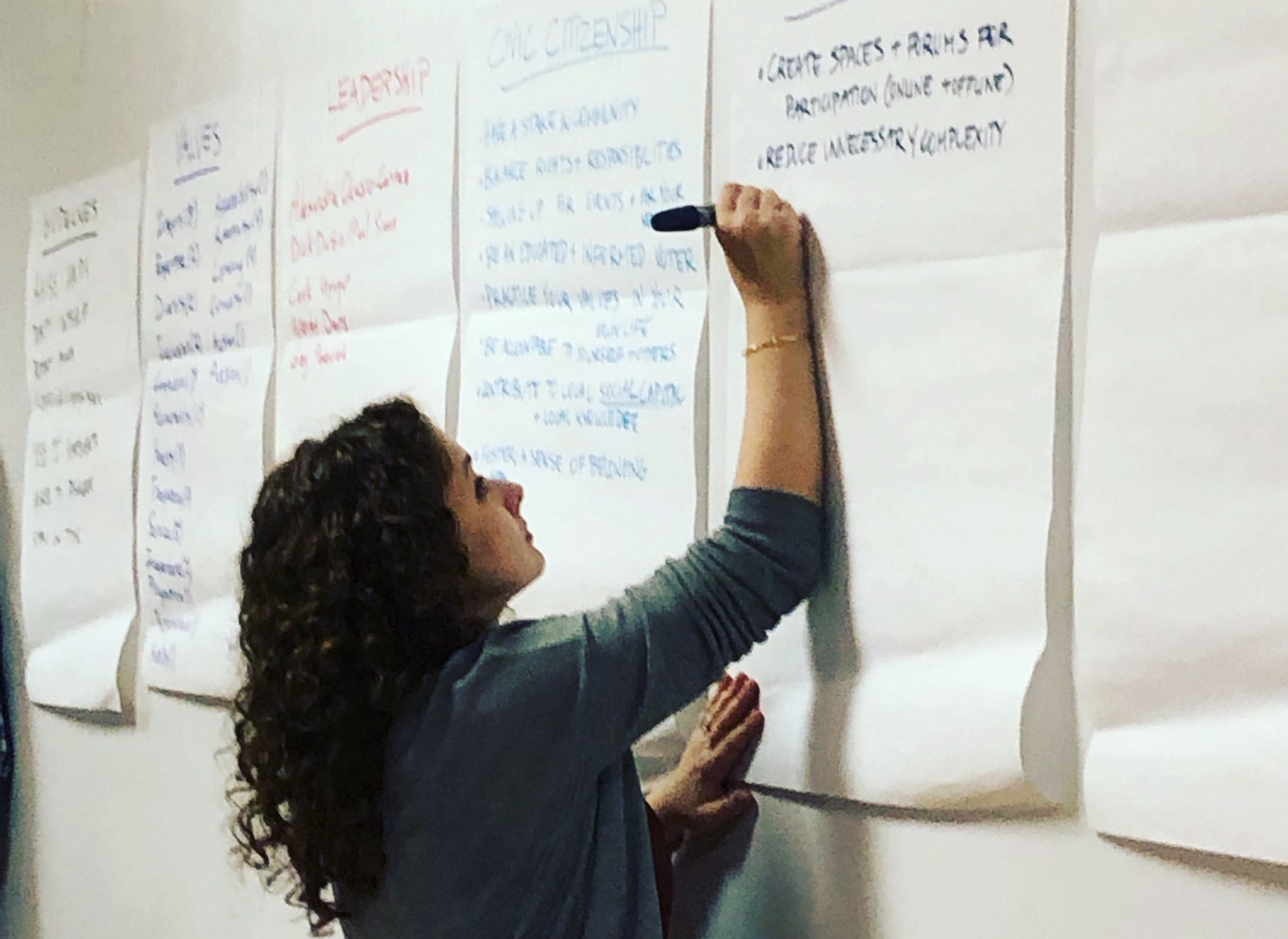What happens when we envision the future together?
By Alicia Bonner Ness
On an evening in early December, a few dozen people gathered in a community center in North Brooklyn. Decorated for the holidays, the room was large and well-lit though sparsely furnished. A ring of tables and chairs faced a large blank wall. The group who gathered were there to address a simple yet profound question: a shared vision for the future of local politics.
I have been fortunate over the past nine months to facilitate almost a dozen such conversations. These discussions are not about candidates or campaigns. We do not debate specific policies or problems. Instead, we create an open and inviting space in which to envision the better future we all want.
Over the course of 90 minutes, participants share their views on five guiding questions:
1.What are the values you hope will guide your political leaders?
2. Name a leader you admire. What qualities make them effective?
3. What are the qualities of a good civic citizen?
4. How can leaders and citizens collaborate to strengthen our community?
5. Imagine you have fallen asleep for ten years and awakened to find that our democracy is thriving. What do you see?
Each person has the opportunity to consider these questions and write down their answers. Afterward, they are invited to discuss their responses with another member of the group. Finally, we consider each question together and scribe the responses on large pieces of chart paper at the front of the room for all to see.
If all politics is (or should be) local, then this is where change starts, not with gripes and criticism but with shared conviction. By shifting the focus away from elections and onto outcomes, we successfully escape the short-term winner-take-all frame that is the Achilles heel of modern politics. By inviting people to consider their shared hopes, we bypass doubt and land instead on conviction. Individuals have the chance to meaningfully connect with other members of their community and in so doing deepen their commitment and accountability to take action to make that shared conviction a reality.
The Brooklyn workshops are part of The Vision Project, a collaborative effort of a coalition of organizations to envision a new political future for the borough. Out of our discussion of leadership, community collaboration, and vision, we hope to define a shared understanding of the political future a diverse coalition of Brooklynites desires for themselves and their neighbors.
While Brooklyn is an incredibly diverse place, it is also a political monolith; 85 percent of Brooklynites are Democrats. As such, change here inevitably flows through the Democratic Party whereas across the rest of the country, our future inevitably will depend on our ability to engage those currently unengaged by a partisan frame.
While America’s 45th President continues to stir anger and outrage from both sides of the political spectrum, our politics confronts a crisis of identity. What does it mean to be a Democrat? What does it mean to be a Republican? What is the standard of leadership to which we will hold our leaders, regardless of party? What is required of us as active citizens? How do we show up as allies and advocates? What does it mean to be an American?
We have successfully lionized voting as the ultimate civic act, but without answers to these questions, what exactly are we voting for? We are contending simultaneously with the fractious interference of digital technology and social media in the same moment that the dysfunction of our political parties perverts political engagement. Six in ten Americans do not feel represented by either political party and 23 percent are political disengaged. It is insufficient to continue to bang the drum for voter turnout. We need spaces that invite all of us, regardless of party or political persuasion, to be seen, heard, and supported.
A month ago, I launched the Purpose Power Town Hall Tour to invite this kind of dialogue in 15 cities across the United States. While many of the question will be similar to the first five listed above, their answers will be different. From place to place, we will rediscover the collective power that results from meaningful individual action and in so doing discover a shared commitment to shift the paradigm toward greater civic accountability and engagement.
Showing up in this way is not something we can demand of our elected officials. There are too many of us and too few of them. And ultimately, isn’t that the point? Elected leaders are a necessary part of a functioning society but they are not the only means we have to confront the challenges we face. At a local level, our collective ability to address our own needs may be even more powerful.
What if, instead of depending on them to solve all our problems, we put politicians in their place, to listen to us as we listen to each other? In so doing, we can honor the diversity of lived experience that makes us individually unique at the same time that we discover the shared conviction that connects us all.
Originally published on Firebrand in December 2018.

